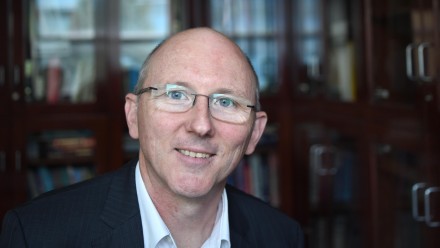Mutational mechanisms and oncogenic switches in solid tumours
Professor Sean Grimmond, Director & The Bertalli Chair in Cancer Medicine, University of Melbourne Centre for Cancer Research, Melbourne, VIC
It is now well established that a cancer’s mutational burden drives tumour formation, influences disease progression and can dictate sensitivity to chemotherapy. Professor Grimmond’s laboratory has pioneered large-scale cancer genome sequencing of >1000 patients, primarily as part of the International Cancer Genome Consortium (ICGC). These efforts have addressed three core questions: i) What are the root causes of DNA damage, ii) What are the genetic events that lead to tumour formation and disease progression, and iii) how can personalized cancer-genome analysis improve treatment selection and patient outcome? These studies have provided tools to readily detect DNA damage repair deficiencies causing accumulated somatic mutation across all common malignancies (eg. Deficiencies in Homologous recombination, Mismatch repair, Base excision repair, nucleotide excision repair, Trans-lesional repair etc). Furthermore, these studies have also highlighted a range of oncogenic events capable of driving tumorigenesis far beyond simple point mutations in coding sequences. Taken together, these insights are redefining our understanding of solid tumorigenesis and provide opportunities for improved clinical intervention based on personal cancer genome information.
Sean Grimmond is the founding Bertalli Chair in Cancer Medicine and Director of the University of Melbourne Centre for Cancer Research in the Victorian Comprehensive Cancer Centre. He holds a Genetics degree from University of New England and a PhD in Pathology from the University of Queensland and became a Founding Scientific Fellow in The Royal College of Pathologists of Australasia in 2011. Previous appointments include the Chair of Medical Genomics at the University of Glasgow (2013-2016), the Co-Chair of the Scottish Genomes Partnership (2014-2016), Professor of Genomics at the University of Queensland (2009-2016) and the founding Director of the Queensland Centre for Medical Genomics (2009-2013).
Over the last 20 years, Professor Grimmond’s research has focused uncovering the underlying genetics controlling key biological processes and pathological states through integrated omic analyses.
He has pioneered whole genome analysis of cancer patients at scale and led Australia’s International Cancer Genome Consortium efforts into both Pancreatic and Ovarian cancers. His current research is firmly focused on real-time omic analysis of recalcitrant cancers, testing the value of personalizing therapies and further cancer genome discovery.












